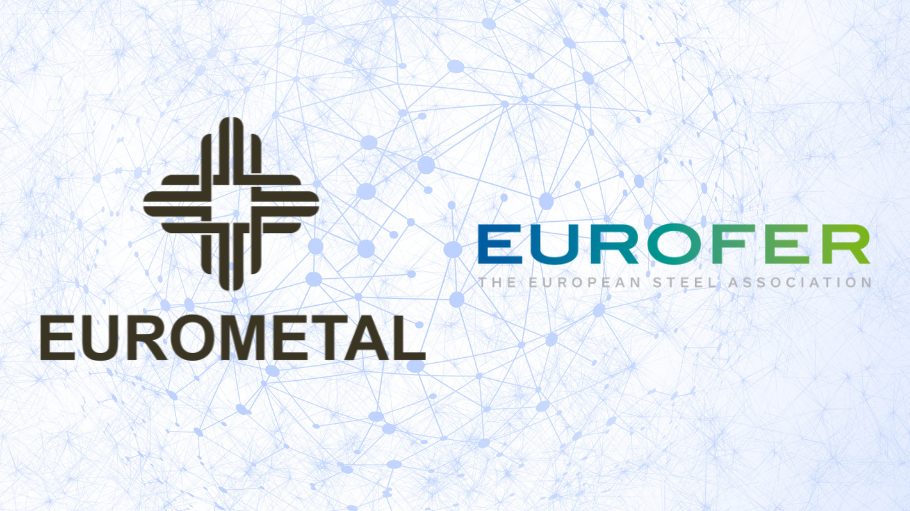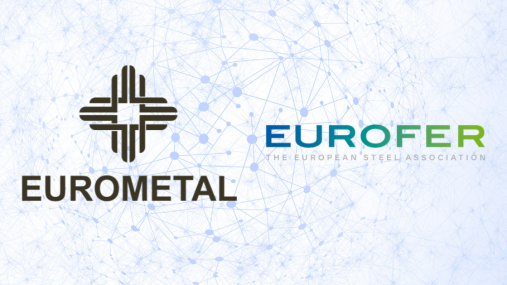
Press releases » Joint Statement | EUROFER and EUROMETAL convene to support the European Steel Supply Chain
Joint Statement | EUROFER and EUROMETAL convene to support the European Steel Supply Chain
Downloads and links
Recent updates

Brussels, 28 April 2025 - In April 2025, EUROFER and EUROMETAL leaders convened to discuss potential collaboration areas for strengthening messaging and initiatives to support the European steel and steel-using industries. This initial exploratory meeting was prompted by the Steel Dialogue on 4 March 2025, hosted by the European Commission, during which EUROMETAL raised concerns regarding the impact of imported steel derivatives on European distribution, processing, and manufacturing industries.
Both EUROFER and EUROMETAL acknowledged that a robust manufacturing base is essential for strategic autonomy and involves the entire steel supply chain — including both steel production and processing. The Steel and Metals Action Plan represents a strong starting point, where the European Union recognizes industry challenges and importance, but this requires concrete translation into effective regulatory frameworks. Sharing knowledge and perspectives across the value chain will enhance the design and implementation of such policies and measures.
EUROMETAL represents a significant portion of the intermediate steel processing market in Europe — comprising nearly 50% of deliveries in the EU. These processors face substantial challenges to remain competitive and require stronger, more targeted support. A steel industry confronted with a shrinking customer base, particularly in downstream sectors, poses broader risks for the entire European industrial ecosystem, as the same accounts for the European steel customer base that requires a viable steel industry in Europe.
The two associations underscored that the weakening of this vital supply chain puts at risk 13.6 million direct jobs across steel processing, intermediate suppliers, and manufacturing sectors in the EU. The consequences go far beyond economics — this situation threatens a wider European deindustrialization, with the relocation of R&D capacities, loss of innovation hubs, and increased dependence on external markets.
The meeting marked an excellent beginning for further analysis and discussions and will be followed up in due course.
Alexander Julius, President of EUROMETAL, commented:
“The EU steel using and steel making industries are at stake. The focus of European policymakers needs to be expanded to the complete supply and value chain of our industry. Joint efforts of EUROFER and EUROMETAL will form a solid basis approaching this important topic sustainably.”
Axel Eggert, Director General of the European Steel Association (EUROFER), stated:
“Both EUROMETAL and EUROFER have a strong interest in a vibrant European steel value chain at the benefit of the EU's economic resilience and strategic autonomy as well as investment, innovation and quality jobs in Europe. We therefore appeal on EU policymakers to support our joint efforts.”
Contact
Lucia Sali, Spokesperson and Head of Communications, +32 2 738 79 35, (l.sali@eurofer.eu)
About the European Steel Association (EUROFER)
EUROFER AISBL is located in Brussels and was founded in 1976. It represents the entirety of steel production in the European Union. EUROFER members are steel companies and national steel federations throughout the EU. The major steel companies and national steel federation of Turkey, Ukraine and the United Kingdom are associate members.
The European Steel Association is recorded in the EU transparency register: 93038071152-83.
About the European steel industry
The European steel industry is a world leader in innovation and environmental sustainability. It has a turnover of around €191 billion and directly employs around 303,000 highly-skilled people, producing on average 140 million tonnes of steel per year. More than 500 steel production sites across 22 EU Member States provide direct and indirect employment to millions more European citizens. Closely integrated with Europe’s manufacturing and construction industries, steel is the backbone for development, growth and employment in Europe.
Steel is the most versatile industrial material in the world. The thousands of different grades and types of steel developed by the industry make the modern world possible. Steel is 100% recyclable and therefore is a fundamental part of the circular economy. As a basic engineering material, steel is also an essential factor in the development and deployment of innovative, CO2-mitigating technologies, improving resource efficiency and fostering sustainable development in Europe.

Developed with the support of the Offshore Wind Foundation Alliance and European Wind Tower Association, the position paper outlines the strategic importance of wind components for Europe’s green transition and calls for targeted measures to strengthen their role within the NZIA.
Brussels, 2 April 2025 - The latest data unveiled by the OECD in its meeting in Paris draw an extremely worrying picture, where global steel excess capacity is expected to grow from an estimated 602 million tonnes in 2024 to 721 million tonnes by 2027 – over five times the EU's steel production. The European steel industry - already severely hit by the spill-over effects of global overcapacity and the U.S. steel import tariffs - reiterates the crucial need for strict and effective EU post-safeguard measures to ensure its survival.
Brussels, 19 March 2025 – The Steel and Metals Action Plan, unveiled today by the European Commission, provides the right diagnosis to the existential challenges facing the European steel industry. Concrete measures need to follow swiftly to reverse the decline of the sector, re-establish a level playing field with global competitors, and incentivise investment and uptake of green steel in the market.